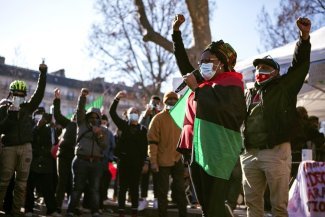Leaving aside the obvious concerns raised by the military overturning an elected president, arresting him and his inner circle, attacking the media accused of supporting him, and opening fire on demonstrators.
Leaving aside, also, the speculation about the turn this new phase could take in the long process of change triggered by a desperate Tunisian street vendor, let’s get back to 30 June and the tsunami of protest that swept Egypt on an unprecedented scale.
Who were the millions of Egyptians on the streets?
Not just the young hyper-connected urban intellectuals that captured international media attention in January 2011.
Not just the workers who had already brought turmoil to the industrial zones under Mubarak and have since been an untiring force at the heart of the revolutionary struggle.
But entire families, who had not even come out on to the streets against Mubarak.
Individuals who had previously supported the Muslim Brotherhood. Even members of remote rural communities in Upper Egypt, voicing their discontent for the very first time.
There was a diversity far removed from the simplified binary vision of a country supposedly divided into secular liberals and conservative Islamists.
What was the common bond between these socially and politically heterogeneous crowds? Their shared rejection of a regime that, within one year, had brilliantly demonstrated its inability to manage the country and its dogged determination to impose its partisan ideological vision.
Social discontent had already played a major role in Mubarak’s fall. Two and half years on, the everyday struggle to survive has become even harder. Nearly one in five Egyptians goes hungry.
With stagnant economic growth, double digit inflation, staggering foreign debt, Egypt’s alarming economic equation only served to fuel President Morsi’s die-hard mission.
Far too busy trying to sustain his constitutional hold-up and ensure the Muslim Brotherhood’s monopoly on state power, he did not notice the doubts, then the anger, rising among those watching him exploit the values of Islam for authoritarian, sectarian and corrupt ends.
"Social justice is the first challenge to be met," said Ahmed El-Borai, a key opposition figure, who had laid the foundations for a radical reform of industrial relations while heading the Labour Ministry in 2011, before being dislodged by the coming to power of the Muslim Brotherhood.
With labour disputes multiplying under Morsi’s reign and independent trade unionists denouncing even more brutal repression than under Mubarak, promoting peace and economic development cannot be achieved by simply exercising the right to vote.
True democracy needs to be exercised daily and it cannot afford to scrimp on real social dialogue. It is neither quick nor easy, but it is a revolution of mentalities.
The army, the Islamists, those nostalgic about the old regime, international and regional political and geostrategic powers are no doubt going to keep trying to exploit the mass protests. And bread will become scarcer for too many Egyptians. But the taste of renewed dignity is a strong leaven of genuine change.








